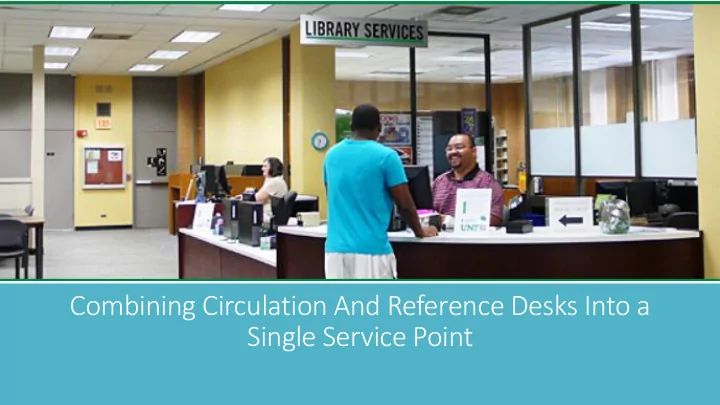

Combining Circulation And Reference Desks Into a Single Service Point
Presentation abstract This presentation will describe how a single service point for Circulation (Checkout, Interlibrary Loan, Reserves, Fines) and Reference services was created at the University of North Texas Libraries (UNT). It will examine how the Access Services and Reference departments successfully worked together to plan, implement and assess a combined service desk. Hours of operation, desk staffing, cross training and layout will be discussed. Concerns from a staff perspective, student perspective and management perspective will be highlighted. Key external and internal benefits as they relate to staff resources, customer service, collaboration, innovation and communication will also be discussed.
Multiple Service Desks
A Plan was Needed!
Summer 2012
The Planning Process Goals Staff Naming Concerns the Desk Training Services Hours of Staffing Operation
Goals • Library Services Desk: One single service point for Circulation, ILL and Reference Services • Increased cross training opportunities • Cost savings on student assistant expenditures • Full time staff have more time for skill development, projects, assessment • Reference librarians have more time for liaison work • Increased communication
Services to Offer • Checkout • Reserves/textbooks • Fines • Library Cards • Graduate Carrels • ILL • Reference
Hours of operation • Library Services Desk Sunday: 1p-midnight Monday-Thursday: 8am-midnight Friday: 9a-6pm Saturday: Noon-4pm • Reference Staffing Sunday-Thursday: until 10pm Friday: until 6pm Saturday: Noon-4pm • Willis Library Open 24/7 Self Checkout Machine
Desk Layout Access Reference Services Access Access Services Services
Desk Staffing Graduate Library Assistant (GLA) and Student Assistants Back-up from full time Access Services staff Bell set up Full timer desk shifts Back-up from reference librarians Liaison referrals GLA supervisors available for more difficult reference questions
Training • Blackboard Learn • Basic training checklists • Defining skill sets • Access Services staff: basic reference training • Reference staff: basic circulation training
Reference Training for Access Services Staff • Catalog searching tips Keyword vs. Subject searching • How to use electronic databases • How to search UNT Digital Collections • How to find subject and class page LibGuides • Who are the Liaison Librarians How to find a liaison librarian (guide) Reference by appointment • How to use on-call reference assistance-no longer use • RefStats: inhouse question/answer database
Access Services Training for Reference Staff • Circulation policies and procedures Sierra training Checking out books/reserves • Interlibrary Loan policies and procedures ILLiad training Checking out ILL materials • Ref Stats Circulation training
More cross training opportunities for Access Services Students Service • Service • Basic Desk Shelvers Desk Reference • Basic • Shelving staff Reference
Cross training Benefits • Staff gain a more well rounded perspective • Better service for patrons • Managers can fill scheduling gaps more easily • Able to expand skill development • Opportunity to get more feedback from staff
Concerns and questions from full time staff • Reference Quality of reference services How much Circulation training will we need Will there be an on-call service We will need to work closely with Circulation • Access Services Quality of circulation services How much Reference training will we need Will there be a reference person at all hours the desk is open We will need to work closely with Reference
Concerns and questions from Student Assistants • How will reduced number of desks affect employment Will I lose hours? Will there be layoffs? • All the patrons will be coming to one desk? • How will my job change?
Overall Results • Better service to patrons • Better management of staff • Better utilization of staff time • Better organization • Better usage of space • Better allocation of student expenditures
External Benefits • Patrons not sent from desk to desk to receive help • Reduce ‘library anxiety’ • Patrons receive quicker/higher quality service • Easier to market services • Positive and welcoming service desk environment for patrons • More embedded librarians in classrooms and buildings • More library instruction courses
Collaborate Internal benefits Communicate Educate Empower • More collaboration between staff • More empowered and engaged staff Engage • Increased avenues of communication • More awareness of what each area does • Student assistants gain valuable research skills from working alongside staff • Reference staff gain a better understanding of circulation processes and procedures in a busy service area • Staff have more back up for busy times
Cost Savings
Innovations
Online Holds
Embedded Librarian Opportunities
Pay Fines by Phone
Liaison in the Stacks
Food for Fines
State of the Stacks Report
Ask a Shelver
Monthly Book Displays 2014 ALA LLAMA PR Xchange Best of Show Winner
Expanded Document Delivery/ILL
Textbooks Project
Questions? Mary Ann Venner, Head of Access Services: maryann.venner@unt.edu Sarah Abrams, Stacks Management Supervisor: sarah.abrams@unt.edu Holly Dolan, Graduate Library Assistant: holly.dolan@unt.edu Francesca Martinez, Graduate Library Assistant: francesca.martinez@unt.edu UNT Libraries, www.library.unt.edu
Recommend
More recommend